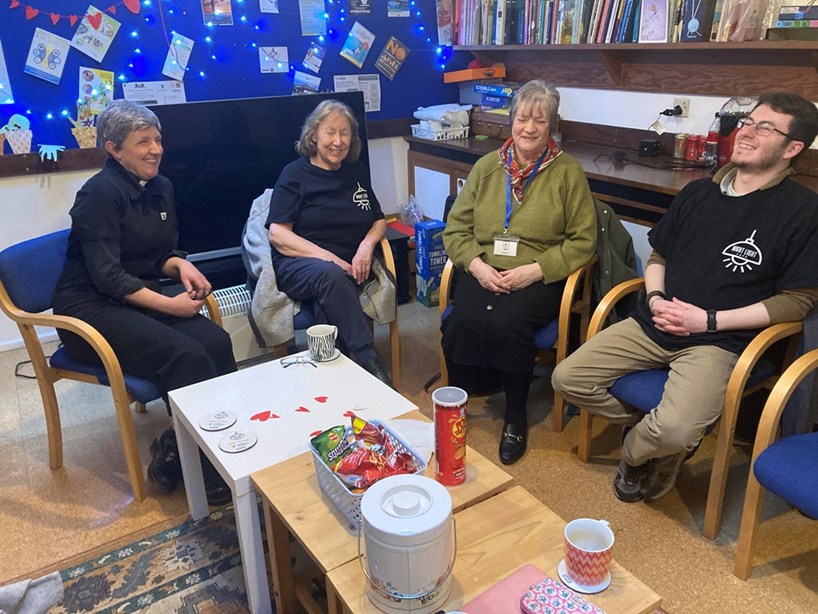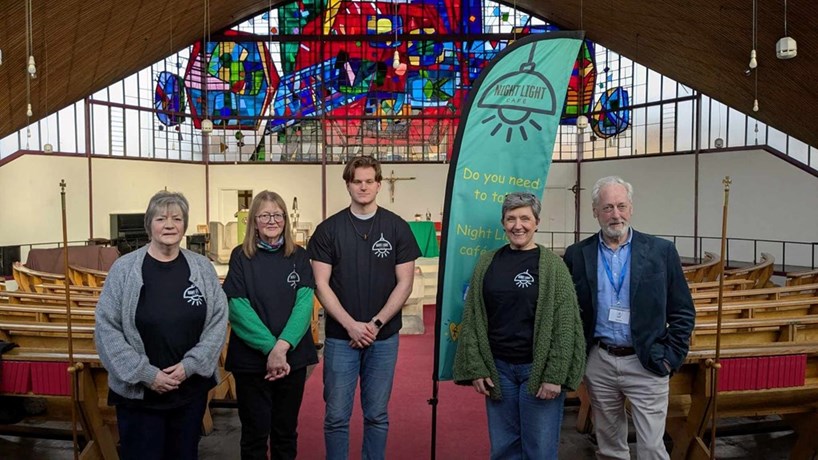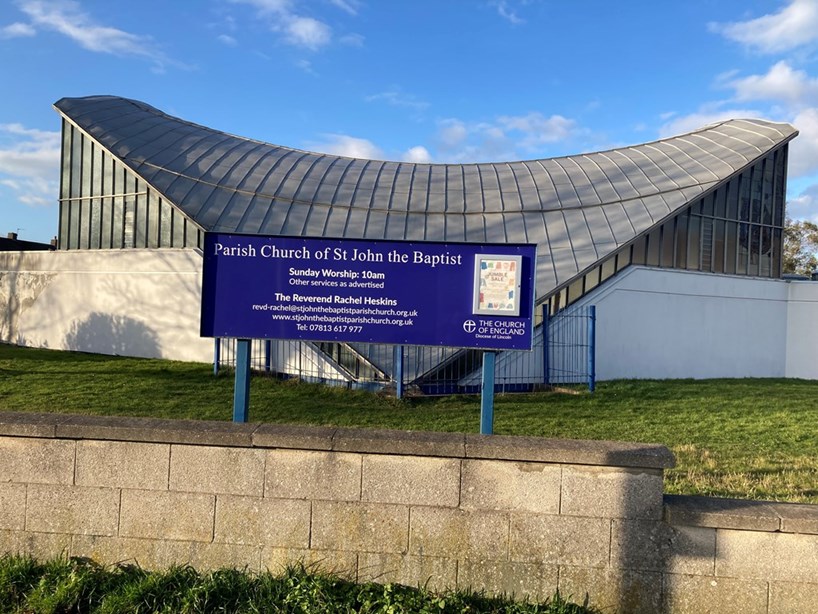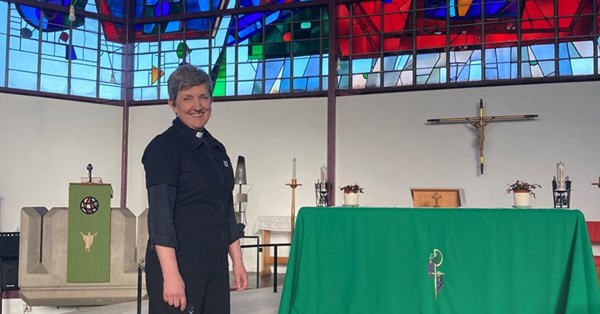THE first sight of St John the Baptist, Ermine, is so unexpected that it stops you in your tracks.
This newspaper declared the Sam Scorer building to be the most modern church in Britain when it opened in 1963, on the large post-war estate in Lincoln where it was — and remains — a thing of wonder.
Technically, it’s a hyperbolic paraboloid. But local people affectionately call it the “Pringle” church for the curve of the concrete and aluminium roof that creates the appearance of a vast nomadic tent. There are many echoes of Coventry Cathedral, consecrated the previous year, not least in the glory of the abstract stained glass.
But here’s the thing that ties it firmly to the present: the temporary church it replaced was the first public building on the estate in 1956, when a local historian declared it to be “an essential agent in the fostering of a sense of identity” among the new residents. The present Vicar, the Revd Rachel Heskins, describes it as an “outward-facing church” that is very much part of the estate community of 6000 residents.
It’s no surprise then, to find the church hosting one of nine weekly NHS-funded Night Light Cafés in Lincoln, whose stated aim is “to provide a safe space and a listening ear for whenever life feels difficult”.
The cafés have their roots in the local charity Acts Trust, founded by Alive Church in 2006, to empower local neighbourhoods to thrive via community projects “not designed to do things to, or for, people, but, rather, with people”.
Stacey Marriott, the Night Light Café manager, was part of an ecumenical health and well-being group that, in 2018, when discussing the needs of the area and how the Church might stand in a gap, identified a need for out-of-hours mental health support, and especially evening support. A partnership approach by NHS commissioners confirmed that need.
“Often, people were attending A & E when what they really needed was somebody to sit alongside them, and listen to them in the moment,” Mrs Marriott says. “A lot of police time was also being taken: if the police came across someone needing mental-health support, they would have to take them to A & E and sit with them until they were seen; so there was a real shortage of support available.”
 Pat Ashworth Volunteers at St John’s Night Life Café, from left: the Revd Rachel Heskins, Sandy Gould, Sue Fleshbourne, Toby Hodgson
Pat Ashworth Volunteers at St John’s Night Life Café, from left: the Revd Rachel Heskins, Sandy Gould, Sue Fleshbourne, Toby Hodgson
Churches in Lincoln have a track record of high levels of support for their communities, she says: something reinforced by their work during the pandemic.
“In Lincoln, local libraries are often run by the churches who meet there on Sunday morning,” Mrs Marriott says. “The NHS were so open to us using churches. We’ve been encouraged to use other places as well, and we’ve used coffee shops, for instance. But, actually, the church cafés were better attended than those not in a church building.”
Currently, Monday’s Night Light cafés take place at St John’s, and at Bridge Central (Assemblies of God). St Giles Methodist Church hosts the Tuesday café, and Bailgate Methodist the Wednesday. The Breakthrough Centre (Elim) does Thursday; the Energize Youth Centre, Friday; The Salthouse (St Swithin’s Church), Saturday; and Bridge Central (AOG), Sunday.
“We offer non-clinical support from trained volunteers. But part of our offer is that we signpost guests to other organisations, because we’re really keen to help people build up their own support network that is not dependent on ourselves, but actually spreads through their whole day and their whole week,” Mrs Marriott says.
“Any church leader would say that it’s not all plain sailing, but I do think that what we have in Lincoln is really special in regard to church unity. We have more than 100 volunteers, including students who come on placement from Bishop Grosseteste University. We get a lot [of people] from the local churches, but also many who don’t have any faith.
“It’s a dream come true for me. That it would actually happen from sitting around the table dreaming about it, as the health and well-being group, to the reality now. . .
“It has spread outside of Lincoln as well, and now there are 25 cafés altogether across the county, working with a variety of churches and organisations.
 Volunteers at St John’s Night Life Café, from left: Sue Fleshbourne, Jackie Howell, Kristin Niedbala, the Revd Rachel Heskins, Jeffrey Heskins
Volunteers at St John’s Night Life Café, from left: Sue Fleshbourne, Jackie Howell, Kristin Niedbala, the Revd Rachel Heskins, Jeffrey Heskins
“The special thing for me is hearing the stories of the individuals who come, and just seeing how they benefit from it. We had some people who would go all week without speaking to a single person, and found it very difficult, actually, to start attempting to do that. But now it’s part of their routine, and their confidence is really growing, and their mental health is really improved.”
Mrs Heskins describes the NHS funding that St John’s receives for the volunteer hours and for running the café as “a gift for us — an absolute gift”. She adds: “For a church like ours, on an estate with the highest density of social housing in the parish than anywhere else in the diocese of Lincoln, that’s a huge weight off our minds. We can really concentrate on doing it well.”
In the summer months, the café takes place in the worship space itself, where the sun streams in and the window can be a talking point “because it’s so abstract and beautiful”. But, in winter, they gravitate to the back room that we’re sitting in today – “balmy, because we can have the heating on”, she says. It’s softened with a string of lights, and it feels relaxed, and easy, and non-threatening.
She doesn’t wear her clerical collar for the café. “If I was sitting here with the collar on, I think that would create a sort of hierarchy,” she reflects. “We’re just all volunteers. We’re all the same.
“It’s very clear from our Facebook page that this is a completely safe, non-judgemental space where you can just come and be yourself and have some company. That’s all we offer. That’s what we promise. We’ll make you a cup of tea, or coffee, or hot chocolate, or whatever, and talk if you want to talk, and leave you alone if you want to be left alone.”
Acts Trust’s email to the church every Monday morning gives the names of people who have notified the Acts team that they would like to come. Some will have been referred by a GP, a community psychiatric nurse, or another health-care professional.
But, although the team at St John’s ideally like to know who’s coming, in case of any special considerations that need to be made, they wouldn’t turn anybody away, Mrs Heskins says.
“They’ll also let us know the names of anyone who has been banned. Occasionally, you do get someone whose behaviour has been inappropriate and you know you just can’t function. We’ve got mental-health first aid, but we’re not professionals. We have to make sure we’re safe; so our guests ring the doorbell. But we’ve never had anything here that we couldn’t handle.”
The core of the St John’s group is about half a dozen people who come every week and have got to know one other. Isolation is a key contributory factor to poor mental health among Night Light Café guests in general, and these safe spaces can be a lifeline — whether guests want to talk, or just to sit in the company of others. For some, this may be the only point of human interface: the only thing that they go to during the week.
 Pat Ashworth The hyperbolic paraboloid design of St John the Baptist, Ermine. It is one of several churches in Lincoln hosting a weekly mental-health support café
Pat Ashworth The hyperbolic paraboloid design of St John the Baptist, Ermine. It is one of several churches in Lincoln hosting a weekly mental-health support café
“We’re quite well placed here, because there’s a few other things on the doorstep that we can signpost people to. We have a lunch club, and we’ve got a foodbank in the church hall. The council is investing very heavily in this community at the moment; so there are things we can help people locally to get themselves integrated into,” Mrs Heskins says.
“Our county councillor gave us our first little bit of money to start off our ‘Free Tea Friday’. We regularly produce statistics and information, because we’re able to say, ‘This is what we’re doing, and this is what you’re getting for your money.’”
Mrs Heskins took up her incumbency in January 2019, and a year later came the pandemic. For all the difficulties, frustrations, and deprivation of that time, it has proved in many ways to be a blessing, in that she was able to keep in touch with every congregation member weekly by telephone and, by delivering shopping, prescriptions and free school meals on the estate, to get to know the families.
Sue Fleshbourne, a churchwarden, grew up on the Ermine estate and, apart from one spell away, has spent her whole life there. She loves the church, particularly for its strong sacramental tradition. “It’s my spiritual home,” she says. “I love the liturgy. It would break my heart if we didn’t have it.” She’s a key volunteer at the Night Light Café, cooks for the lunch club, and helps with the multitude of other weekly activities.
“We’re a small congregation. But we face outwards,” Mrs Heskins reiterates. “There’s this private minibus company that you see around Lincoln, with a silhouetted profile of the city on the side. There’s Lincoln Cathedral, and the windmill, and some of the houses. And then they’ve got this funny little roof that’s us. It basically says we’re part of the identity of the city. I really like that.”

















